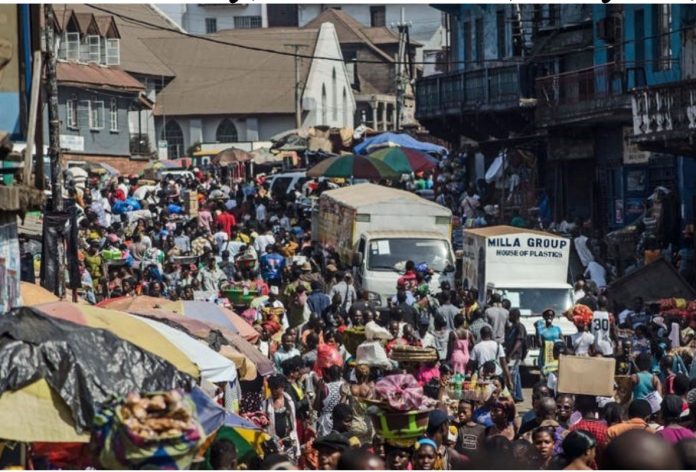Aruna Turay, AYV News, May 21, 2025
See Abacha Street amidst Mpox epidemic
Leader of Africa CDC’s Mpox Incident Management Support Team, Dr Ngashi Ngongo, has said Sierra Leone has half of Africa’s confirmed cases of Monkey Pox (Mpox), with its outbreak expanding over the past six weeks and cases rising over 71% last week compared to the week before.
He said the country is the latest addition to the Incident Management Support Team (IMST) list of the most Mpox-hit nations, with skyrocketing cases triggering concern across Africa.
And yet, people in Sierra Leone are joking about the epidemic. Go to Freetown’s business district – Abacha Street, Dove Cut, Funkia and other major markets and witness first-hand how MPOX spreads swiftly.
To date, fewer offices and public places have Veronica buckets and preventive facilities against the spread of the epidemic. Enter the lorry and bus parks, enter the public buses, taxis, ferries and see how Mpox is easily making its way. Go to night clubs, universities and schools, you will be shocked to see the level of levity people in Sierra Leone are taking Mpox. Yet, the authorities are still silent.
Dr. Ngashi Ngongo said, “Of great concern is that in just one week, the number of notified cases has increased by over 71 percent, and the number of confirmed cases has increased by over 61 percent. That is to say that it is really an epidemic that is on the upward trend. We are still concerned about the exponential growth in Sierra Leone.”
He said over sixty-eight percent of patients are male, mostly 30 to 35 years old and over seven percent of the illnesses are in people who have HIV, a high-risk group seen in other African countries during the outbreak.
Dr Ngongo revealed that in April this year, IMST conducted a mission in Sierra Leone and found that the country’s health system was overstretched and overcrowded, with grossly inadequate bed capacity to accommodate more than 1,000 patients in Mpox treatment facilities.
He said the treatment centres in the country only had 60 Mpox isolation beds, and most of the patients were receiving home care, which makes it difficult to ensure compliance with isolation.
This, according to him, was why about 800 active cases are currently being managed through home-based care. “But at the same time, there’s also a huge challenge related to the home-based care, that is, there’s very low isolation compliance. It’s very difficult to maintain people in their homes. They tend also, despite being isolated, to continue participating in social activities and then exposing more members of the community to the virus,” he said.
He said the assessment also revealed that surveillance in Sierra Leone is mostly passive surveillance. “That is why the positivity rate is far above 50 percent. It means that the people come when they are already very advanced. They come on their own to seek care, instead of being found through active surveillance that can pick them up early and shorten the exposure of the population,” said Dr Ngongo.
Though Sierra Leone has good Mpox testing coverage and a good testing rate, it currently has a low contact-tracing ratio, said Dr Ngongo. Fewer than one in every six confirmed cases has had the benefit of contact identification, and the genomic sequencing rate, which should be around 5 percent, is currently well below 1 percent. Close to 24,000 people have been vaccinated so far, and almost 60 percent of them are healthcare workers.
Since the start of last year, 24 Mpox-affected African countries have reported 129,711 Mpox cases. Of these, 29,609 were confirmed, and about 1,751 related deaths were recorded.
Sierra Leone’s National Public Health Agency (NPHA) says all 16 districts in the country are now affected by Mpox. Authorities have expressed concern about the escalating cases, as well as the severity of the cases, especially in people living with HIV.
Sierra Leone is one of 10 countries that have received vaccine supplies with support from partners like Gavi, UNICEF, and the Africa CDC. However, with a population of 8 million people and just over 61,000 doses of the vaccine available, those at highest risk will be prioritised, officials say.
Beyond Sierra Leone, the vaccine shortage is a critical challenge that must be addressed. Africa CDC will continue advocating for increased vaccine availability in the short term, and for local manufacturing and strategic stockpiling in the medium to long term, as part of the legacy of this Mpox outbreak.
Sierra Leone recorded its first case on January 10, 2025. Immediately after, Minister of Health Dr Austin Demby declared a Public Health Emergency, saying at the time the move was necessary to prevent the virus from further spreading.

